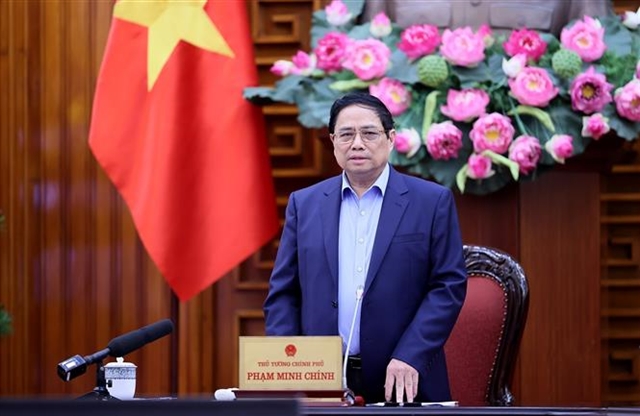 Society
Society


|
| Prime Minister Phạm Minh Chính speaks at the meeting. VNA/VNS Photo |
HÀ NỘI — Prime Minister Phạm Minh Chính on Saturday presided over the Government’s meeting to discuss the situation and measures to ensure electricity supply for production, business and consumption in the last months of 2023 and 2024.
According to the Ministry of Industry and Trade, electricity supply in the first ten months of 2023 was generally assured. However, there were certain periods in late May and early June when the northern region experienced electricity shortages due to unusually dry hydrological conditions and extreme heat, leading to a sudden and prolonged increase in electricity demand. It is estimated that the total electricity production and import for the entire electricity system in 2023 will reach 280.6 billion kWh, a 4.6 per cent increase over the same period in 2022, reaching 98.6 per cent of the plan.
To meet the 2024 socio-economic development plan, calculations show that balancing electricity supply and demand in 2024 may require an increase in electricity load growth from 6 per cent to 8.96 per cent. The electricity system is expected to meet the needs of socio-economic development in most scenarios. However, in an extreme scenario with increased electricity demand and adverse hydrological conditions, the northern region may still face electricity shortages.
During the meeting, participants assessed the current power supply capacity and the causes of recent local power shortages. Leaders of ministries, branches, and Deputy Prime Ministers discussed various scenarios and proposed plans to ensure sufficient electricity for the 2024 socio-economic development plan.
These plans include strategies for operating electricity supply and demand, ensuring an adequate supply of raw materials and fuel for power plants to operate at full capacity, maximising the utilisation of power sources, investing in new power projects, and encouraging electricity savings, particularly during peak periods. Additionally, it is suggested that there should be a specific mechanism prioritising the development of power sources in the northern region.
In conclusion, Prime Minister Phạm Minh Chính said that, in 2023, there has been no shortage of power sources to support socio-economic development. However, power shortages still occurred at certain localities due to limited management. Looking ahead to 2024 and beyond, he emphasised the importance of developing scenarios and closely monitoring electricity operations based on power sources, electricity load, distribution, utilisation and prices.
For 2024, the goal is to create electricity operating scenarios ensuring that the entire country has a minimum of 50,000 MW and a maximum of 52,000 MW of electricity available for production, business and consumption.
Achieving this goal will require securing sufficient raw materials for electricity production, including water, coal and gas.
Efforts should be made to maximise the use of domestic coal resources and import coal only when domestic demand cannot be met, the PM said.
Additionally, water resources should be managed, and water should be stored in reservoirs for both agricultural production and hydroelectricity. Renewable energy sources should be integrated into the system to harmonise benefits between people, businesses and the state. Gas power projects should be maximised, and the possibility of importing gas should be considered, if necessary, he added.
The Prime Minister stressed that any problems and issues should be addressed through coordination and collaboration among ministries and branches. If a problem falls outside their authority, it must be reported to government leaders for consideration and resolution.
Regarding electricity transmission, the Prime Minister urged ministries and branches to coordinate efforts to remove bottlenecks and urgently commence the construction of the extended 500-kV transmission line, circuit 3. This may include building additional lines to regulate electricity distribution, ensuring national energy security, particularly for the northern region.
Regarding distribution, the Prime Minister requested an acceleration of the transfer of the National Load Dispatch Centre to the Ministry of Industry and Trade, along with the resolution of any legal issues. If necessary, the government should issue an additional decree to address these matters. Relevant ministries and branches should work closely with the Ministry of Home Affairs to resolve these issues completely.
For electricity usage, the Prime Minister assigned the Committee for Management of State Capital at Enterprises and Vietnam Electricity to collaborate with news agencies, newspapers and media to actively promote and guide the economical, safe and effective use of electricity.
The Prime Minister also instructed ministries and branches to conduct research on adjusting electricity prices appropriately, considering investment, operation, distribution and other costs, as well as any price adjustments due to inflation. Additionally, there should be policies in place to ensure that price calculations align with the social security policies of the Party and State.
Concerning rooftop electricity trading and direct electricity trading, Prime Minister Chính assigned Deputy Prime Minister Trần Hồng Hà to direct the Ministry of Industry and Trade and the Ministry of Justice to coordinate with national agencies and associations to develop appropriate, effective and timely treatment plans. VNS




